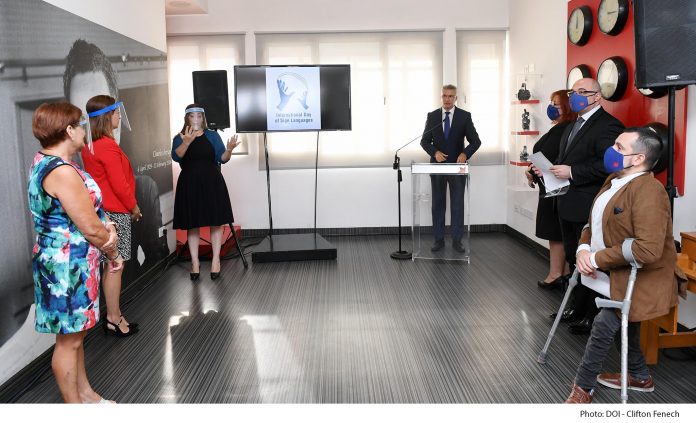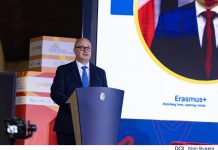
On the day promoting the United Nations’ International Day of Sign Languages, Minister within the Office of the Prime Minister Carmelo Abela, responsible for national broadcasting, announced that the ministry, in collaboration with the PBS will be launching an information campaign to bring sign language closer to the general public, not only to explain the importance of this language for the society at large, but to state that sign language in Maltese is indeed an official language of this country. The campaign is also being carried out in collaboration with the Association of the Deaf and the Maltese Sign Language Council.
Minister Abela stated that currently, the new EU Directive, which is being discussed at Committee level in Parliament, will be focusing more on accessibility. He went on to state how he believes it is time to start a discussion on the particular reference in Broadcasting Law stating that the media must be encouraged to make their services gradually accessible to the deaf and how they can be helped to do so.
Minister Abela explained how he would like to have more representation and participation of people with disabilities in the media. “These people should not only be spectators but also protagonists in broadcasting. It is for this reason that I have appointed the Commissioner for the Rights of Persons with Disabilities as a director on the PBS Board. I wanted there to be a voice in the highest management structure of the company to ensure that the message is heard and that the company is sensitive enough about its obligations to people with disabilities”, said the minister.
The minister continued by saying that, “through the choices made by the new PBS Board we immediately showed that we had two main priorities: quality broadcasting and also a strong emphasis on the inclusiveness and accessibility of PBS programmes. By that we did not refer only to the fact that the technical quality of broadcasting needs to be ensured anytime, anywhere, or simply that we want to be present on the internet and on social media. We also wanted to state that our programmes reach everyone. They also reach out to those who, due to a lack of physical ability, are currently being denied doing so as other members of our society”.
He added that through PBS, more accessible programmes will be made available to those who communicate in sign language, including current affairs programmes. He stated that PBS already broadcasts the six o’clock news in sign language and that it was instrumental in bringing important broadcasts such as the Budget and updates on COVID’s progress to the public in this language.
The minister also spoke about how he would like to see more people pursue a career in the field of sign interpretation. Here he said that he is informed that 12 people are following a sign language interpretation course at University, with five of them being employed by a government agency.
Minister Abela thanked the Association for the Deaf and the Gozo Association for the Deaf, who were also present for this conference for all their work. He also thanked the PBS Board represented by Chairperson Professor Carmen Sammut and the PBS Management represented by CEO Charles Dalli for their vision and energy directed towards allowing broadcasting to advance in this way. In her speech Professor Sammut said that as director of the PBS board she will push forward the agenda for more accessibility and more knowledge about Maltese sign language. Mr Dalli said that the series of clips focusing on learning Maltese sign language are intended for everyone to learn basic words or phrases that we need to communicate when in everyday life we encounter people with hearing deficiencies. They will also have subtitles for more accessibility. He also announced that throughout the autumn schedule, PBS will retain the news in sign language at 6pm while another sign language service will also be launched. The programme Insights will be broadcast every Friday at 10.30pm with sign language interpretation.









